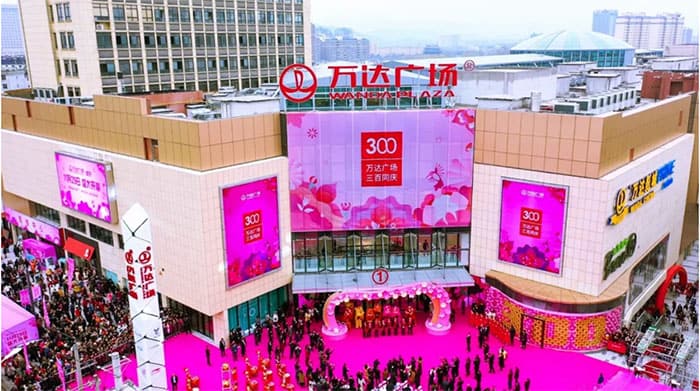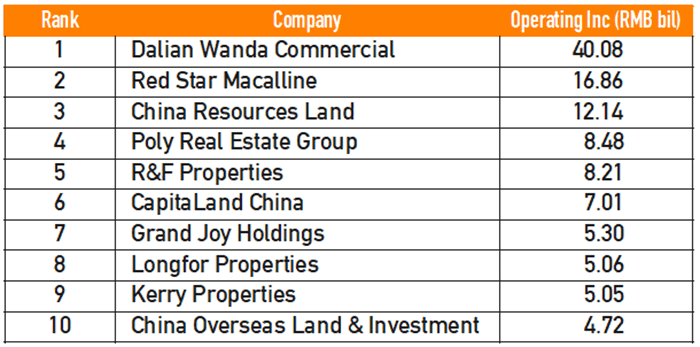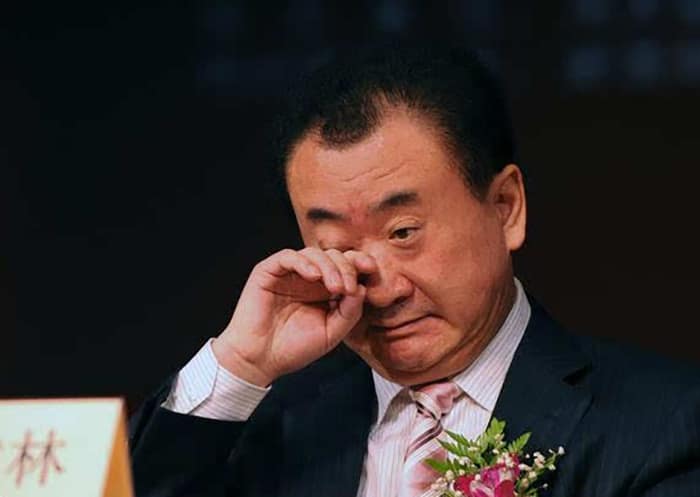
Wanda opened its 300th Wanda Plaza in Xianning in November
Wang Jianlin’s Dalian Wanda Group may have been forced to unwind its overseas ambitions, but the billionaire’s property business in mainland China shows no signs of flagging after it hauled in operating income more than double that of its closest rival for the second year running, according to recently compiled statistics for 2019.
Dalian Wanda Commercial Management Group retained its crown as the mainland’s top commercial developer by operating income last year, ranking above Red Star Macalline and China Resources Land which took the second and third position respectively, in a study published recently by mainland real estate information provider CRIC.
Despite tighter credit conditions forcing some developers to scale back, combined operating income for the top ten commercial developers in mainland China grew to RMB 113 billion ($16.29 billion) last year from RMB 98 billion in the preceding 12 months.
Income from commercial rents, hotel operating fees, rental apartments and other revenue streams for the country’s top landlords was up more than 13 percent compared to 2018 and topped RMB 100 billion for the first time.
China’s Top 10 Developers by Operating Income in 2019

Source: CRIC
Wanda’s Long March Back to Stability Continues
Cementing Wanda’s position at the top of China’s rental food chain, the company took in RMB 40.08 billion from its operations in 2019 — more than double the RMB 16.86 billion recorded by the second largest developer, Alibaba-controlled furniture mall operator Red Star Macalline. The retail specialist continued its dominance thanks in part to a more than 18 percent jump in operating revenue compared to 2018, when it took in RMB 32.74 billion.

Wanda’s Wang Jianlin has had a few eventful years
To further bolster its future revenues, Wanda capped off 2019 by announcing that it was opening a further 17 Wanda Plaza malls in December, after opening its 300th mainland shopping centre just one month earlier. That 300 mall milestone came just five years after Wanda had brought its shopping centre portfolio to 100 assets.
The company founded by billionaire Wang Jianlin has refocused its energies on expanding its domestic retail development business after being branded by the government in 2017 as a dangerously indebted company and subsequently selling off nearly all of its $5 billion overseas portfolio.
Red Star Macalline Retains Second Spot After Alibaba Buyout
While Wanda kept its top spot in China’s commercial developer rankings, Red Star Macalline managed to hold onto second place as its takings climbed 7 percent last year to reach RMB 16.86 billion.
The furniture mall operator’s increase in income came during the same year that private equity firm Warburg Pincus sold its controlling stake in the Hong Kong-listed developer to Alibaba for just less than HK$2.7 billion ($350 million).
China Resources Land Takings Jump 30%
2019’s third-place finisher, China Resources Land saw its revenues jump more sharply last year as operating income climbed by 30 percent to RMB 12.14 billion for the 12-month period, compared to RMB 9.34 billion a year earlier.
The Shenzhen-based developer’s swelling fortunes were helped along by it having opened two more of its MixC malls in the mainland cities of Jinan and Guilin, as well as by the re-opening of its refurbished Shanghai Times Square mall.
CapitaLand Leads Foreign Players
While the residential sector is dominated by local developers, players from overseas continue to play a significant part in the country’s commercial property market.
Singapore’s CapitaLand, which holds 41 percent of its S$131.9 billion ($94 billion) assets under management in China, ranked sixth among commercial developers in China, with operating income of RMB 7.01 billion – a 13 percent gain over 2018.
According to its website, the Temasek Holdings-backed giant now has 51 shopping malls, 26 office projects and nine business parks in mainland China.
Following the opening of the company’s 1.12 million square metre (12 million square foot) mega project Raffles City last September, CapitaLand said that a 46 percent year-on-year jump in the group’s revenue for the fourth quarter — which rose to S$2.4 billion – was due in part to income derived from the Chongqing development.
Hong Kong-based Kerry Properties took ninth place after pulling in RMB 5.05 billion in revenue from its commercial properties last year. Sun Hung Kai Properties, one of Hong Kong’s biggest builders, slipped out of the top ten last year, despite the company’s yearly income going up 3 percent compared with 2018 to reach RMB 4.03 billion for the 12 months ending 31 December.
Leave a Reply